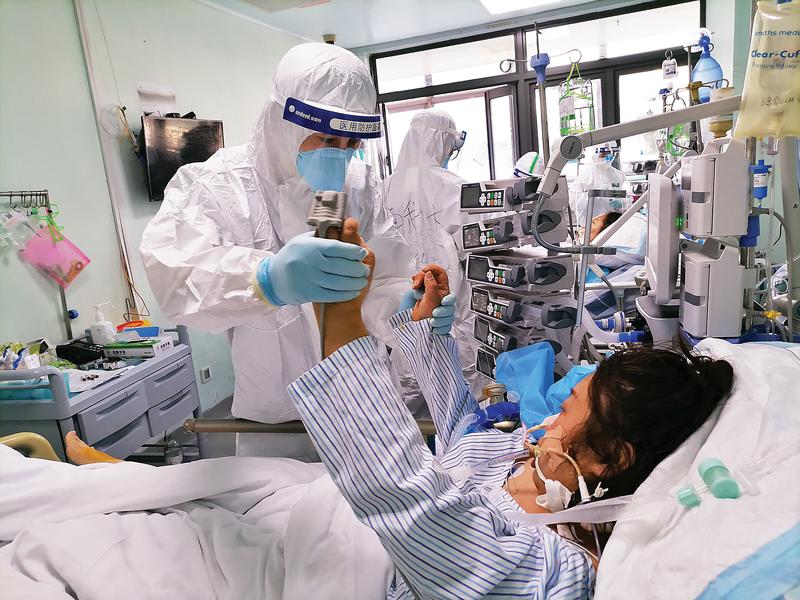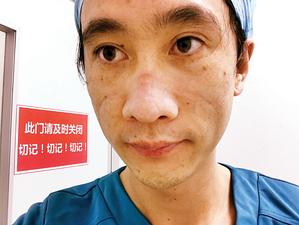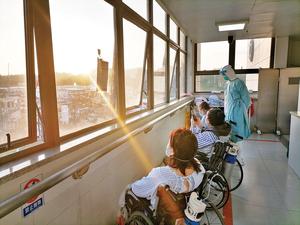 Li Xu, a doctor with the University of Hong Kong–Shenzhen Hospital, helps a patient infected with the coronavirus exercise her arms at the Third People’s Hospital of Shenzhen. (PHOTO PROVIDED TO CHINA DAILY)
Li Xu, a doctor with the University of Hong Kong–Shenzhen Hospital, helps a patient infected with the coronavirus exercise her arms at the Third People’s Hospital of Shenzhen. (PHOTO PROVIDED TO CHINA DAILY)
It was mid-February, and the battle against the novel coronavirus seemed to be at a stalemate. They were the worst days so far for Intensive Care Unit (ICU) doctor Li Xu’s ongoing temporary assignment of over 45 days to the Third People’s Hospital of Shenzhen, the only location for treating COVID-19 patients in the city.
“Though no new patients came in, the current patients were not getting any better. It was like the battle that had reached a standstill,” the 35-year-old Chinese-mainland doctor said. The morale of Li and his colleagues plummeted to a new low when two patients died, one after another.
On Jan 31, Li was sent from the University of Hong Kong–Shenzhen Hospital to the Third People’s Hospital of Shenzhen, the city’s only hospital admitting coronavirus patients. His assignment was to save the lives of the most severely ill patients infected by the coronavirus.
A 36-year-old patient there surnamed Hu was near death. Li’s team was dedicated to saving her. Large areas of her lungs were severely infected, and she was being kept alive on a ventilator. Li made up his mind — he must not let her die.
Hu came back to Shenzhen with the disease after visiting relatives in Wuhan, Hubei province. Her visit to the early epicenter of the coronavirus outbreak in late January took a heavy toll on her family. Her husband, mother and 7-year-old daughter were also infected. They recovered and were discharged, but Hu’s condition had deteriorated. She was intubated and kept sedated for more than 10 days.
The medical team made several attempts to save her using different approaches, but nothing worked. The team was very disappointed, as it seemed that no treatment improved her condition, and she would die. Li decided to bring the young woman out of her sedation and adjust treatment according to her reactions.
It was a risky decision. After she came out of the sedation, her breathing became faster, and that may have affected the exchange of oxygen and carbon dioxide in her body. There are also many other serious complications that could have happened.
When she came out of her sedation, her mood fluctuated to extremes, and she even tried to pull the tube from her mouth. Hu had to be restrained by Li and the nursing team. Li sat beside her and explained to Hu her condition, and told her that removing the tube could end her life.
Li encouraged her in the following days, telling her not to breathe too fast, and helping her learn to adapt to the tube in her mouth and also helping her exercise her arms and legs. He cured her diarrhea and supported her nutrition, and also arranged for Hu’s husband and daughter to cheer her up with a video call.
After many trials, Hu’s condition gradually stabilized. The tubes were removed on Feb 23, four days after Li took charge of her treatment. She showed signs of returning to good health and later was transferred to a general ward. A senior doctor told Li that Hu’s recovery had lifted the morale of the medical teams at the hospital.
Hu also credited Li with her recovery. She talked about the heavy blow to herself and her family and how her plans had been upended. She acknowledged she had survived thanks to the encouragement of doctors and family members. She would be going home soon.
 Wearing masks for long periods of time has left marks on the face of Li Xu. (PHOTO PROVIDED TO CHINA DAILY)
Wearing masks for long periods of time has left marks on the face of Li Xu. (PHOTO PROVIDED TO CHINA DAILY)
Call to arms
In late January, when Li was asked if he was willing to work on the front line fighting the pandemic, he stepped up, saying it was the duty of every medical worker.
He spends most of the time at the Third People’s Hospital in the ICUs working with patients. The normal shift for ICU workers is four hours. Sometimes he stays for more than seven hours.
He checks patients from head to toe and adjusts their equipment as needed. Using his fingers, he has performed colon cleansing for comatose patients every two or three days to prevent bacteria from infecting the body.
To date, the hospital’s ICUs have admitted more than 40 patients. Each ICU doctor takes charge of three patients during peak hours. When Li finishes work with his patients for the day, he walks among the wards and checks up on other severely ill patients and encourages them.
He has even visited patients in his spare time. Li has taken only two days off since he began his assignment.
Colors in the dark
Li observed that many ICU patients are suffering from high anxiety. They ask him constantly, “When will I recover?” and “When can I be discharged?”. Li takes the time to encourage them and help them get through their ordeal. He helps them get out of bed, exercise breathing, and helped them with psychological counseling.
One evening, he took three severely ill patients in wheelchairs to watch the sunset together. “What they saw every day were doctors and nurses with protective suits. What they heard was only the sound of medical instruments. They needed something vibrant and that gave them hope,” he said.
 On Feb 29, Li Xu takes three severe coronavirus patients in wheel chairs to watch sunset at the Third People’s Hospital of Shenzhen. (PHOTO PROVIDED TO CHINA DAILY)
On Feb 29, Li Xu takes three severe coronavirus patients in wheel chairs to watch sunset at the Third People’s Hospital of Shenzhen. (PHOTO PROVIDED TO CHINA DAILY)
Another female patient, surnamed Zhang, was one of the three, though not directly under Li’s care. He visited her often and just talked, gave her encouragement. Her crisis passed, and she was transferred to a general ward later.
Zhang, together with her husband, daughter, son-in-law and 2-year-old grandson, were all infected by the coronavirus. They returned to Shenzhen after visiting Wuhan, just as Hu did.
Zhang had lost hope, especially after learning her grandson had been infected. She recalled that the little boy once asked her: “Grandma, help me! Save my mom! Save my dad!”. “I thought he was too little to understand. Actually, he was quite aware of the situation, ” Zhang said.
Zhang said it was the medical workers there that gave her the confidence to overcome the disease. “Without their help, I may not have survived. They treated me just like my family members,” she said.
Li said the empathy of others may be connected to his love of music, for which he has as much as a connection as for his medical calling. He arrived for his assignment equipped with cassette recordings of his favorite music and some rock T-shirts. He also brought a speaker, and later replaced it with a bigger one to better enjoy the music. He said he was under a lot of stress at the beginning of his assignment, and music helped relieve the pressure and saved his life. He likes to listen to Painkiller music, especially the song Your Inviolable Freedoms.
The experience here has deepened his commitment as an ICU doctor. “One of the most fortunate things in my life is that I studied critical care medicine, and one of the proudest things in my life is that I became an ICU doctor,” he said.
Not every doctor has the determination to be an ICU doctor. There’s immense mental and physical pressure treating dangerously ill patients, Li said. Yet for him, nothing compares with the sense of fulfillment when a patient is brought back from the brink of death.


